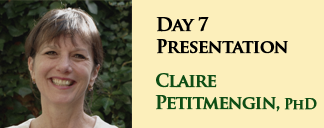Claire Petitmengin, PhD, Professor, Institut Mines-Télécom; Associate Researcher, Archives Husserl, Ecole Normale Supérieure, Paris.
Numerous scientific studies are now conducted on the neurophysiological effects of meditation practices and on the neural correlates of meditative states. However, very few studies have been conducted on the experience associated with contemplative practice: what it is like to meditate – from moment to moment, at different stages of practice – remains almost invisible in contemporary contemplative science. Recently, “micro-phenomenological” methods have been developed to help us become aware of the micro-dynamics of lived experience and describe it with rigor and precision. The first part of this talk will present a pilot project aiming at applying these methods to the description of two processes of which meditation practice enables the practitioner to become aware: the process of losing contact with the current situation and generation of virtual ones in “mind-wandering” episodes, and the process of emergence of a thought. In a second part I will present how the micro-phenomenological investigation of the early stages of processes such as the emergence of a perception or an idea highlights a dimension of experience where the separation usually perceived between the subjective and the objective poles vanishes, and micro-actions that instant after instant create and support the process of co-constitution of these poles.
360 Video Login required
